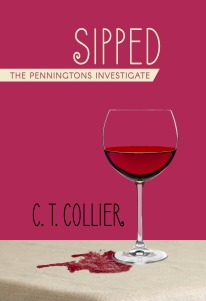New Voices in Academic Mysteries
by C.T. Collier
 Even before I joined the ranks of college faculty, I loved a good academic mystery—one with a professor solving a murder, whether it happened on campus or on vacation. Now that I write academic mysteries (The Penningtons Investigate) I’m loving the fresh voices among the ladies of mystery whose sleuths are professors. Here are just a few.
Even before I joined the ranks of college faculty, I loved a good academic mystery—one with a professor solving a murder, whether it happened on campus or on vacation. Now that I write academic mysteries (The Penningtons Investigate) I’m loving the fresh voices among the ladies of mystery whose sleuths are professors. Here are just a few.
An environmental educator and researcher, Charlene D’Avanzo’s debut Cold Blood Hot Sea throws the reader into the contentious field of marine research. Sleuth Dr. Mara Tusconi is a smart resourceful warm-hearted scholar at the Maine Oceanographic Institution, where eager students and ambitious colleagues surround her. Every twist of D’Avanzo’s page-turner reveals more about research methods, the young scholars in training who will carry the work forward, and the sabotage that undermines experiments.
Lori Rader-Day’s academic mystery, The Black Hour, is a dark gritty look at the power differential between professors and students that sometimes has deadly consequences. The story highlights the fascinating ways both professors and students confront, ignore, or rationalize blatantly unethical behavior.
Drawing on an academic career in psychology, Lesley A. Diehl brings humor to the campus scene in her sleuth, psychology professor Laura Murphy. In Failure is Fatal, Laura’s study of sexual harassment on campus is compromised when a student is murdered and a detailed written description of the murder is among the surveys submitted days before the murder occurred. Besides her intelligence and dogged determination, Laura uses her unique ability to tick people off on her way to finding the killer.
There’s still more humor in Alexia Gordon’s debut mystery, Murder in G Major. Sleuth Gethsemane Brown, an award-winning musician, is challenged with shaping up a school orchestra in time to win back a coveted trophy. At the same time, the ghost of a famous musician who expects her to find out who murdered him haunts her house. Gethsemane uses gumption, moxie, spunk, and many belts of bourbon to save the day.
Author and music professor Carolyn Marie Wilkins pens another music-themed academic mystery in Melody for Murder. Protagonist Bertie Bigelow is a music professor at a community college in Chicago’s South Side, where she walks easily between the poverty of her students’ world and the glitz of charity galas among the nearby African American community.
Cynthia Kuhn has a fresh take on tenure, the bane of every young professor’s existence. Kuhn’s sleuth, English professor Lila Maclean, is just starting her academic career and dealing with all the challenges of being single in a new town and a new job. Lila’s crafty department chair continually manipulates her into extra work by dangling the carrot of tenure in front of her or cracking the whip of tenure behind her. Those extras propel Lila into murderous complications that demonstrate her investigative skills, ingenuity, and charm.
Whether your taste runs to thrillers or cozies, these lady authors of academic mysteries are sure to please. I hope you’ll share your thoughts in a comment.
Blurb:
Meet the Penningtons: Lyssa, Ph.D. Economics, and her husband “the handsome Brit” Kyle, Ph.D. Computer Science. When their clever minds ask questions, clever killers can’t hide.
After a rough semester, Professor Lyssa Pennington just wants to post her grades and join her husband, Kyle, in Cornwall for Christmas. First, though, she’s expected to host an elegant dinner for Emile Duval, the soon-to-be Chair of Languages at Tompkins College.
Too bad no one told Lyssa murder is on the menu. And, by the way, Emile Duval is an imposter.
Who is he really? And who wanted him dead? Without those answers, the Penningtons can kiss Christmas in Cornwall goodbye.
Buy Links:
Amazon: https://tinyurl.com/y8rkglpe
Barnes & Noble: https://tinyurl.com/y8thfleb
 C.T. Collier was born to solve logic puzzles, wear tweed, and drink Earl Grey tea. Her professional experience in cutthroat high tech and backstabbing higher education gave her endless opportunity to study intrigue. Add to that her longtime love of mysteries, and it’s no wonder she writes academic mysteries (The Penningtons Investigate) that draw inspiration from traditional whodunits.
C.T. Collier was born to solve logic puzzles, wear tweed, and drink Earl Grey tea. Her professional experience in cutthroat high tech and backstabbing higher education gave her endless opportunity to study intrigue. Add to that her longtime love of mysteries, and it’s no wonder she writes academic mysteries (The Penningtons Investigate) that draw inspiration from traditional whodunits.
Links:
Website: https://drkatecollier.wordpress.com
Facebook: kate.collier.315
Twitter: @TompkinsFalls
Goodreads: http://tinyurl.com/zds5zps








You must be logged in to post a comment.